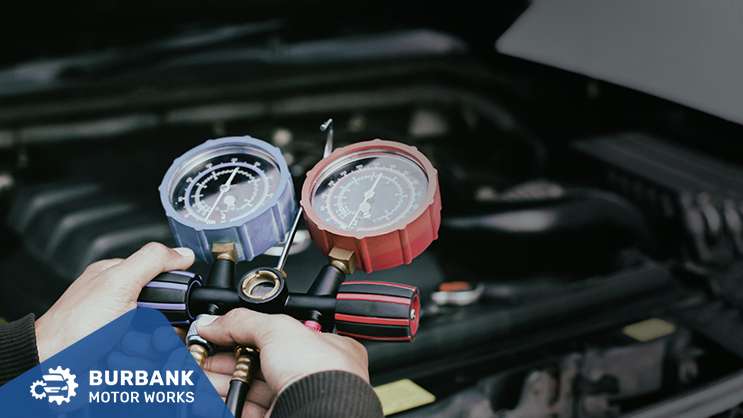
Address: 2208 W Burbank Blvd, Burbank, CA 91506

Mon - Fri: 7:45 Am - 5:30 Pm
Sat: 8:00 Am - 2:30 Pm
Sun: Closed
We'll Be Closed This Sunday – April 20th

Address: 2208 W Burbank Blvd, Burbank, CA 91506

Mon - Fri: 7:45 Am - 5:30 Pm
Sat: 8:00 Am - 2:30 Pm
Sun: Closed
Getting your car AC compressor replacement in Burbank is a simple service that we can take care of. Your air conditioner is vital in providing cold air in your vehicle’s cabin.
Whether you are experiencing cooling issues or unusual noises, Burbank Motor Works will ensure efficient and reliable AC compressor replacements. The service includes replacing the compressor, the refrigerant recovery tank, and utilizing specialized equipment for recovery and charging to ensure your AC system operates at its best.

Based on your type of vehicle, here are steps we undertake to restore optimal cooling performance to your vehicle’s cabin.
In Burbank, the cost of repairing AC compressor depends on the car type, as parts and labor vary. Generally, the replacement cost for an AC compressor is approximately $1,100, including labor cost ranging from $160 to $200, and parts ranging from $650 to $840.
| Cost Component | Range | Average |
| Total Replacement Cost | $810 – $1040 | $1,100 |
| Labor Cost | $160 – $200 | $180 |
| Parts Cost | $650 – $840 | $745 |
Here is an overview of typical costs covering both parts and labor for popular car models in Burbank.
| Model | Labor Range | Parts Range | Total Range |
| Ford F-Series | $197 – $251 | $335 – $513 | $532 – $764 |
| Chevrolet Silverado | $126 – $161 | $499 – $715 | $625 – $876 |
| Ford Focus | $213 – $271 | $309 – $448 | $522 – $719 |
| Toyota Camry | $213 – $271 | $706 – $2199 | $919 – $2470 |
| Toyota Corolla | $173 – $221 | $579 – $2465 | $752 – $2686 |
| Nissan Altima | $157 – $201 | $540 – $657 | $697 – $858 |
| Honda CR-V | $205 – $261 | $512 – $587 | $717 – $848 |
| Honda Civic | $291 – $372 | $571 – $658 | $862 – $1030 |
| Honda Accord | $165 – $211 | $577 – $775 | $742 – $986 |
| Ford Fusion | $181 – $231 | $195 – $339 | $376 – $570 |
In many cases, poor AC performance can often be pinned to a failing compressor or insufficient AC refrigerant levels. Unfortunately, these components work hand-in-hand, complicating the identification of the root cause behind your AC issues.

How can you tell if the problem lies with the compressor? Here are some subtle symptoms that warrant your attention:
Reduced AC vent coldness: Inadequate cooling, even at low temperatures, might signal a faulty compressor. Its diminished pressure hampers refrigerant circulation, hindering cabin cooling efficiency.
Unusual engine compartment noises: Squeals, whines, or chirps during AC activation point to compressor malfunction. Clutch problems, shaft seizing, or oil contamination lead to these sounds and compressor failure.
Inactive compressor clutch: This small plate, the clutch, connects to the compressor’s pulley and manages its engagement. A faulty clutch can lead to constant operation or complete shutdown of the compressor, often accompanied by unusual noises.
Refrigerant leakage: Sensors monitor refrigerant levels; leaks prompt compressor shutdown to prevent damage. Over-compression due to internal issues can burst seals, releasing refrigerant and impeding compressor function.
Belt wear due to pulley issues: Worn bearings dislocate pulleys during rotation, causing belt screeches and early deterioration. This leads to erratic belt movement and acceleration of wear.
Drivers depend on their air conditioning systems to get around comfortably. If you encounter issues with your AC system’s performance, visit Burbank Motor Works, where our technicians will assess and address any concerns. Get in touch with us.
During compressor replacement, additional expenses may include system evacuation and recharge fees, potential refrigerant disposal charges, and any required AC system inspections or tests.
To save on AC compressor replacement, consider preventive maintenance, prompt issue diagnosis, explore aftermarket parts, and seek professional advice for cost-effective options.
Distinguishing between AC compressor issues and refrigerant leaks involves noting symptoms. Lack of cooling points to compressor, while refrigerant leaks show decreased cold air and possible hissing sounds.
Yes, a failing compressor can lead to poor fuel efficiency. Struggling compressors may require more engine power, consuming additional fuel to maintain AC performance.
The compressor, a vital AC component, compresses and circulates refrigerant, enabling heat exchange for cooling. It collaborates with other elements to provide cold air in the cabin.
Regular maintenance includes cleaning or replacing filters, checking refrigerant levels, ensuring proper belt tension, and promptly addressing any unusual noises or vibrations.
Your vehicle’s make and model dictate compressor compatibility. Factors like size, capacity, and system requirements affect the choice for optimal performance and efficiency.
Call us for booking an early appointment and get all your car related problems solved by our experts.